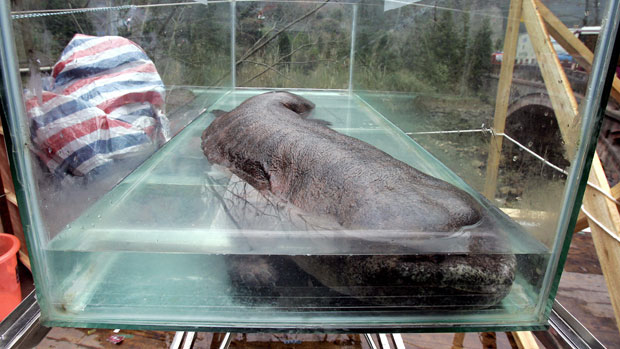'Monster salamanders' once roamed the Earth
Amphibian the size of a car would have sat at the top of the food chain before the arrival of dinosaurs

A free daily email with the biggest news stories of the day – and the best features from TheWeek.com
You are now subscribed
Your newsletter sign-up was successful
Fossils of a previously unknown species of 'monster salamander' the size of a small car have been found in a mass grave in southern Portugal.
Bones of the huge amphibians were found by a paleontologist excavating an ancient Portuguese lake bed.
"It's basically a salamander that's the size of a car," said Dr Steve Brusatte from the University of Edinburgh.
The Week
Escape your echo chamber. Get the facts behind the news, plus analysis from multiple perspectives.

Sign up for The Week's Free Newsletters
From our morning news briefing to a weekly Good News Newsletter, get the best of The Week delivered directly to your inbox.
From our morning news briefing to a weekly Good News Newsletter, get the best of The Week delivered directly to your inbox.
"It's one of those creatures from the distant past that looks like an alien – but it actually has quite a lot of relevance. These kind of big amphibians were the ancestral stock that modern frogs, salamanders and newts came from."
The huge creature, named the Metoposaurus algarvensis, is believed to have hunted like a crocodile, snatching at fish and fighting animals on the shore.
The creature had rows of sharp teeth and a flat head that "kind of looks like a toilet seat", Dr Brusatte said.
Other similar species are believed to have been even larger than the Metoposaurus algarvensis, stretching up to ten metres in length – the size of a minibus, the BBC says.
A free daily email with the biggest news stories of the day – and the best features from TheWeek.com
In the era that preceded the arrival of dinosaurs and mammals, large creatures like this would have been the "big dogs" of Pangaea, the supercontinent that existed before the movement of tectonic plates divided the world into the continents and islands we know today.
Together with other large species, these large amphibians "were some of the main predators and denizens of that world. So our earliest ancestors and the earliest dinosaurs would have had to deal with these guys in their formative years," Dr Brusatte explained.
Dr Richard Butler, of the School of Geography, Earth and Environmental Sciences at the University of Birmingham, told the Daily Telegraph: "Most modern amphibians are pretty tiny and harmless. But back in the Triassic these giant predators would have made lakes and rivers pretty scary places to be."
Dr Brusatte will discuss the findings at a lecture series during the Edinburgh International Science Festival, which runs from 4 to 19 April.